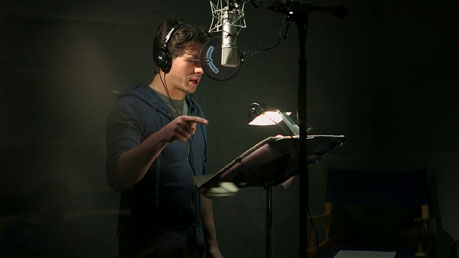
An educational eLearning client recently asked me for referrals for sound studios builders. They’ve decided to build a place for their professors to record. This got me, the professional voice actor thinking…
Both of my university aged daughters have complained about monotone, boring, bad narration in the online courses they have taken which were narrated by their profs. Why is this happening? Why would a prof risk everything they have worked so hard to achieve and turn it into something inferior. Is it because they don’t realize that unprofessional narration is worse than no narration, at all? That a monotone delivery negatively affects the brand of both the university and the professor. It makes them look and sound bad.
SOUND SEPARATES THE PROS FROM THE SIDESHOWS
In our uber connected world, our expectations of quality in infotainment, including our eLearning university courses are high. Studies show we will tolerate less than perfect graphic images before we accept bad audio narration. Think of screen recorded YouTube how-to’s.
Often professors believe they are best equipped to narrate their lessons for podcast or eLearning programs. After all, they intimately know the subject matter, wrote or had a hand in creating the content for the course and generally have years of experience lecturing to classrooms. But not hiring a professional voice actor to narrate their eLearning program is a big mistake.
THE PROFESSOR IS THE BEST TEACHER

Intelligent people do explain things very well, and when asked a question can roll off the most palatable succinct response. They can engage in one on one discussions or lecture to several hundred and entrance and inspire. But performing material they’re familiar with or even wrote themselves aloud from a page is not the same.
When lecturing to a class, they have visual cues giving immediate feedback. It’s clear when students are following the prof and when they are not. So the prof adjusts their delivery. They are in the moment. This is real time vs pre-recording. The prof may be multi-tasking through the lecture, referring to notes, slides or a whiteboard. These cues all help bring their lecture alive.
However, in a studio in front of a microphone all that is eliminated. The untrained narrator almost automatically falls into reading in a flat, non-inspiring way that distracts the listener from the lesson rather than enhances the message. Not to mention distracting audio. Unclear diction. Irritating mouth noises.
THE VOICE ACTOR IS THE BEST NARRATOR

There is an enormous difference between a good speaking voice and a professional voice actor. An adept voice over actor sounds like the professor should sound. Confident, knowledgeable and engaging. He or she is able to explain the content like an expert even if s/he isn’t one. For over twenty years I have narrated medical and pharma eLearning chiefly because I sound like I know what I’m talking about in those areas, even though my background is not in science.
A good voice actor is a partner in the project. Gliding through the script, captivating the listener’s attention and helping make the lesson stick.
One colleague suggested the reason professors want to record their own lectures rather than hire a narrator is because of ego. A chance to shine in a new spotlight. But at what price to the end user, the student? Professors may be good communicators. But they are not professional voice actors.
THE GOAL: MAXIMUM RETENTION
For twenty five years, I have crafted a way of engaging listeners with the sound of my voice. It’s been the focus of my career and I work on it every day. Of course I sound better delivering their lectures than profs do. My craft is using the right inflections, intonations at the right times to maximize interest and enhance the material. The difference is clear.
Each one, the professor and the voice actor has their place. The professor is the fount of wisdom, research and knowledge about the subject. S/he has created the structure and content of the material. Has spent their life researching, publishing and lecturing about their specialty. But transmitting that material for maximum retention? That’s my specialty. Give me call or drop me a line to talk further about it.

Ego does not equal talent. In fact when ego is in the way – creativity goes out the door. This is where hiring a VO Artist can really benefit your project – as it’s OUR job to bring creativity and fluency to your voice recording. It’s what we do. 🙂 Great post, Kim! You’re preaching to my choir beautifully.
Thanks so much for your input Kath. Much appreciated!
Great article Kim,
You really nailed it,And what you said doesn’t only hold true for Professors , Many companies think that they can just have an employee do the voiceover, after all how hard can it be. But more often thennot it just sounds like someone reading from a brochure , essentially a flat and lifeless delivery.
I so agree Bill. And it becomes a difficult sell if we can’t identify why they need the pros. I think we do well for ourselves and the industry as whole when we educate clients as part of our marketing. Thanks so much for your comments!
Well done! Thanks for a great post .i love “playing” professors , scientists and doctors etc as a VO talent 🙂
I agree. It’s challenging and fun. Thanks so much for stopping by Randye!
Having recently had to sit through several hours of the most poorly produced, horribly narrated “tutorials” I’ve ever experienced, I couldn’t agree more. Even worse than having a poor VO was the fact that the thing was essentially unscripted–and so boring and repetitive that I took to keeping tick-marks to keep track of how many times the “talent” said, “you know”. Dreadful.
It’s very frustrating, isn’t it Stuart? Hopefully, the more learners/listeners complain, the more academia may realize the value of voice over professionals. Thanks so much for your comment.
With the explosion of online college and high school courses and curriculum this is so timely. Thanks for taking the time to write it. I hope that it is widely consumed by those in most need of the information it puts forth.
Thanks so much Mike. I hope so too! 🙂
There’s nothing more irritating than having to listen to a monotone voice for hours. It makes it hard to focus and follow the content.
Teaching professionals should be the first to acknowledge this. Great article Kim.
I love it, Dan. You hit the nail on the head. “Hard to focus” An audio narration should help the learner focus, not fight or distract them. Thanks so much for your comment.
I spoke with an e-learning developer the other day and plainly asked why, after spending some much time and money on creating the module, would you ask the receptionist to voice it? The answer? “Never really thought of it in that way.”
We’ve got to get the word out better to these developers that “pro is the way to go”!
Marie Hoffman
Holy Kaboley, Marie. 1000%! It takes education, and I guess as we are the ones with the vested interest in it, it is up to us to do the educating. So let’s spread the word, sistah!
Exactly, Kim! Unprofessional narration is worse than no narration. Thank you for this fantastic article. You articulated my feelings and experiences perfectly.